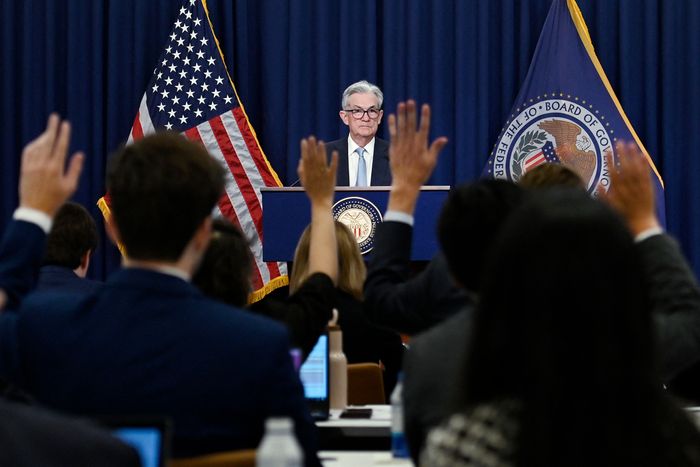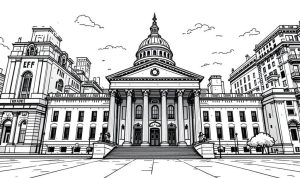Pantera Capital CEO Warns That The Fed’s Strategy Has Created A Big Bubble In Housing
The Fed is tasked with a dual mandate: to ensure price stability and aim for maximum employment. But according to Dan Morehead, CEO of crypto hedge fund giant Pantera Capital, there’s a third thing that the Fed has been doing — running a Ponzi scheme.

In his latest Blockchain Letter, Morehead says that the Fed’s “manipulation of the government and mortgage bond markets” is “the biggest Ponzi scheme in history.” The expert investor even issued a warning on CNBC recently, saying that it’s likely that a “recession is coming.”
Federal funds rate

By maintaining the federal funds rate too low, according to Morehead, the Fed committed a serious policy error.
“The difference between inflation (their mandate) and their policy tool (fed funds) is much larger than at any point in history — including the disastrous 1970s,” he writes.
“They left rates at zero. Fed funds were 1.55% before the pandemic. They’ve just gotten overnight rates to back where they were before the pandemic policy eruption when inflation was only 2.30%.”
By this point, we are all well aware that inflation is no longer at 2.30 percent. According to the most recent Labor Department report, consumer prices increased by 9.1% in June from a year earlier, which is the highest increase since November 1981.
According to Morehead, even that official number was incorrect because it didn’t account for real-time home inflation.
Owner’s equivalent rent, a measure of how much it would cost a homeowner to live in their home if they were renting, is how the official CPI instead gauges housing inflation, and it only increased 5.1 percent year over year in May.
Prices have increased much more than that if you’ve been looking to buy or rent a property. According to the government, owner’s equivalent rent is used since it simply seeks to gauge changes in the cost of habitation, omitting the investment component of property ownership.
Instead, Morehead looks to the S&P CoreLogic Case-Shiller U.S. National Home Price Index, a widely used index that serves as a leading indicator of residential real estate prices in the United States and a housing market barometer. It increased by 20.6 percent year over year in May, and according to Morehead, if we used that as the basis for inflation calculations instead of owner’s equivalent rent, CPI would have increased by 12.5%.
According to Morehead, the Fed still has to hike interest rates “by three or four hundred basis points” to control the inflation that is out of control.
Market manipulation for bonds

Although Morehead acknowledges that the low interest rate strategy was a mistake, he asserts that it is “dwarfed” by the Fed’s manipulation of the mortgage and government bond markets.
He contends that prior to 2020, the Fed let free market actors such as insurance firms, mutual funds, and pension plans to do lending.
“When the Fed got into the mortgage lending business, they really went for it. They completely crowded out all other lenders.”
And that led to a huge increase in housing prices.
“They forced 30-year mortgage rates to hit 2.68%, basically daring people not to buy a house (or two or three), which would obviously create a bubble in housing, which itself contributed to a labor shortage as two million Americans retired early or otherwise left the workforce.”
Officials argue that the Fed’s purchases of securities were essential to “keep markets working” during the pandemic and “convey to the public that the Fed stands ready to backstop important parts of the financial system.”
But when you can borrow money at 2.68% to buy properties that are going up 20% in value per year on average, both homeowners and investors are going to go for it, explains Morehead.
“Over the past two years the Fed bought government and mortgage bonds equivalent to over 200% of all mortgage lending in the U.S.”
While that doesn’t match the exact definition of a Ponzi scheme, Morehead argues that the Fed’s easy money policies has created a huge housing bubble.
Can crypto save the day?

All of that is not encouraging for the American economy.
Numerous analysts, including Morehead, predict a recession. But the pain is already being felt by investors. Many companies are already in a bear market as the S&P 500 is down 20% year to date.
On the other side, the Fed is more upbeat. Fed Chair Jerome Powell stated last month that the American economy is in “good shape” and is “generally well positioned to withstand tightening monetary policy.”
Bonds, stocks, and real estate will be impacted by interest rate increases, according to Morehead. However, some asset classes have a lower correlation with the interest rate markets than others.
“I can easily see a world in, say, a year when stocks are down, bonds are down, you know, real estate’s down, but crypto is rallying and trading on its own — very much like gold does, or soft commodities like corn, soybeans all doing very well.”
Morehead’s Pantera Capital specializes in blockchain technology. It launched the first cryptocurrency fund in the U.S. in 2013.
That said, Morehead did note that crypto is “very correlated with risk assets.”
DISCLAIMER: The Information on this website is provided as general market commentary and does not constitute investment advice. We encourage you to do your own research before investing.
Join CoinCu Telegram to keep track of news: https://t.me/coincunews
Follow CoinCu Youtube Channel | Follow CoinCu Facebook page
Annie
Coincu News






















